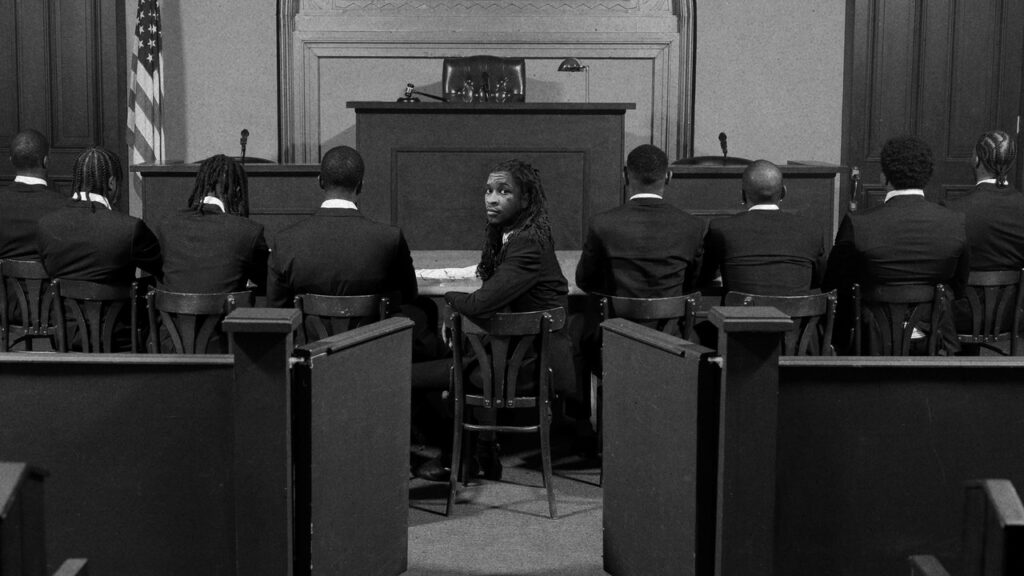
A third of the way through Business Is Business, the record Young Thug released with little warning during his 14th month behind bars as he awaits trial following a 56-count RICO indictment in his native Georgia, comes “Wit Da Racks.” The song leverages his keen pop instincts and elastic eccentricities at once. Nominally about the most banal part of being a famous rapper—the chorus is built around Thug summoning a club owner to pay him for a walkthrough appearance—his madcap opening verse expands, contracts, and contorts, beginning with a cascade of syllables that matches the “waterfall” shimmer of his jewelry.
But by its end, those nods to dull wealth grow syntactically strange: “What’s on your wrist?/Million,” he raps, the last word enjambed with the question. He brags of having beautiful women “to kick it with,” where all the emphasis is on the elongated “iiiiiiiiiit.” He’s zen about chain snatchings—he’s sure he’ll get his back—and calls girls “suburban” for having pretty toes. But the oddest thing Thug says is that “every album got no skippin’”: odd not because his LPs are padded with filler, but because there’s never been any sense that Thug thinks of his catalog in those discrete, contractually measurable terms.
I have no firsthand knowledge of the way Thug works, and what details we have been given by his collaborators—producer Dun Deal saying he once asked to see the sheet of paper Thug was holding while he recorded, only to be shown “weird signs and shapes” instead of words—seem to get us further from any real insight. Yet from near the beginning of his career, massive hard drive leaks and long delays of hypothetical records have clouded the provenance of the material that is eventually released, while recent album titles (Punk, So Much Fun) suggest icebergs of unreleased music that have been picked apart and organized based on underlying sonic elements. Business Is Business, perhaps due to its nature as a cobbled-together collection from someone who can’t access a recording studio, even to comb through his vaults, frequently recalls Thug’s loosest, most apparently improvisatory work. It’s all the more compelling for it.
This is despite the window dressing of a pop blockbuster. The album is bookended by nakedly commercial plays: the noodling, 90-second Drake turn that begins opener “Parade on Cleveland” and the preamble, from fun.’s Nate Reuss, to closer “Global Access.” Each implies not only chart gamesmanship but—through Drake crooning about a release from prison and a celebration in Atlanta and Reuss singing “They will try and lock you up/Drag your name down through the mud… ’Cause that’s life here in America”—an album that will explicitly address Thug’s legal situation. Beyond the logistical infeasibility, though, is the fact that this has never been the way he writes: Thug’s major themes (an obsession with family, the belief that loving someone else has to compromise or destroy you, being good at robbery) have always come through via triangulation or in muttered asides. Now, A-list guests notwithstanding, asides are all that’s left to assemble a “new” record.
And so the odds and ends become central. Business Is Business is anchored by songs like the plinking “Gucci Grocery Bag,” a beloved leak that’s been kicking around the internet since the beginning of the pandemic, and the Future duet “Cars Bring Me Out,” which takes a Wheezy beat already used by the late Drakeo the Ruler as the setting for crime-luxury vignettes (“Woke up in a mansion/Silk Dior pinstriped couch/Call the car man”) that recall the half-finished Nas narrative songs that used to trickle out to mixtape DJs. In these instances, Thug is rapping upright, animatedly; when he continues the water motif re: his jewels (“Think I’m lying? You can dive in this bitch just like a fish”) he sounds hellbent on convincing you.
Elsewhere he opens up veins, singing about extremes of pain, joy, and paranoia. On the foreboding “Abracadabra,” he follows four bars of wordless harmonizing with “Mistress, mistress, tell me who my mistress is,” the question made to feel as urgent as the quasi spiritual concerns that come elsewhere. While “Parade on Cleveland” could have been excised, the other Drake collaboration, the exultant “Oh U Went,” joins “Wit Da Racks” as a potential hit, in large part due to Thug’s unique ability to teeter on the tonal knife’s edge that separates sincerity and contempt. But that song’s buoyancy is immediately qualified by what comes next: “Want Me Dead,” where Thug writes with such rawness that it at times feels voyeuristic to listen. “I told my brother, ‘Take this watch, because I’m vulnerable,’” he raps during the hook, adding, “I let her get away with murder when I fall in love,” underlining that notion that love is necessarily a pact of mutually assured destruction. When he sings about unnamed parties wanting him dead, he couples it with his desperation to bring his own departed friends back to this plane; the border starts to seem more than a little porous.
A handful of days after Business Is Business was released, a new version, expanded and resequenced by Metro Boomin, was uploaded to DSPs. The rearrangement is radically superior: It correctly locates the emotional core of the album, opening with the pained but playful “Jonesboro,” then “Mad Dog” and “Uncle M,” a pair of horror-movie themes that are reserved and explosive, respectively. The tension-release pays off with “Want Me Dead”; only then do we rappel up from the depths of Thug’s psyche, onto the silk Dior pinstriped couches. Nate Reuss is deemphasized by a new closing song; the lesser Drake track is buried in the middle. For all the commercial speculation that’s run parallel to what Young Thug has actually been doing on his records, the truth has always been in the scraps, on the fringes.
